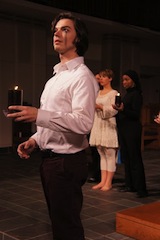
Cincinnati Chamber Opera Scores With "L'Orfeo"
There
may be no more beautifully sung aria in Cincinnati this year than tenor Shawn
Mlynek’s “Possente spirto” (“Mighty
spirit”) in Monteverdi’s “L’Orfeo,”
presented by Cincinnati Chamber Opera Saturday night at Christ Church
Cathedral.

Orpheus’ plea to Charon (boatman of the river Styx) to ferry him into Hades, the aria illustrates the power of music and love, dual themes of Monteverdi’s 1607 masterwork.
Highlight of the Cincinnati Early Music Festival, “L’Orfeo” was a triumph of vocalism and ingenuity, the latter manifested by an imaginative semi-staging, an effective unifying concept and a gloss or two on the Orpheus story. Who was that masked man, posing as a shepherd throughout the opera? Why, none other than Apollo, who sheds his mask in the final act to convey the distraught Orpheus to Heaven.
Monteverdi’s “L’Orfeo” is the granddaddy of opera as we know it, having blended music and drama into a powerful new medium, with choruses, arias, recitative and dance. (It is the oldest opera still regularly performed.) Cincinnati Chamber Opera used music as their unifying concept, giving it two identities: Soprano YoonGeong Lee introduced “La Musica” vocally in the Prologue, while dancer/choreographer Alexandra Kassouf appeared as “La Musica” throughout.
“L’Orfeo” is the tale of Orpheus and Euridice. Orpheus, who can charm all things through music, descends to Hades to recover his wife Euridice, who has died from a snake bite. Pluto, god of the underworld, agrees to let her go, provided that Orpheus refrain from looking back at her until they arrive on Earth. Orpheus looks back anyway and loses Euridice forever. He is consoled by Apollo, who transports him to Heaven.
The opera was performed in the transept and choir of the Cathedral. English surtitles were projected onto a screen at one side. Harpsichordist/organist Elliot Smith and trumpeter Rico Flores provided the instrumental accompaniment. Cast and chorus were dressed in black, with the exception of Orpheus (street clothes) and Euridice (white).
The performance was compelling from the outset. Introduced by a trumpet fanfare, the Prologue was sung and danced by Lee and Kassouf as La Musica. In act I, Euridice (soprano Fotina Naumenko) threw a white flower to Orpheus (Mlynek) from the organ loft. Mlynek’s distinctive, honeyed tenor was nicely complemented by her sweet voice as they billed and cooed at their wedding, accompanied by a chorus of shepherds and shepherdesses.
The chorus became trees in act II, where Orpheus hears of Euridice’s death. The music took a sharp turn to the dramatic as Amitah Prakash as La Messaggera (the Messenger) delivered the bitter news. “Addio tera, addio cielo et sole, addio” (“Farewell earth sky and sun”) Mlynek cried, as the chorus sang of fleeting happiness, and the Messenger sought the comfort of solitude. La Musica (Kassouf) meanwhile painted black tears on everyone’s faces.
Carrying a black candle, soprano Kerrie Caldwell as La Speranza (Hope) led Orpheus up the center aisle in act III, leaving him at the entrance to Hades and quoting the inscription over the threshold: Lasciate ogni speranza, voi ch’entrate,” “Abandon hope, ye who enter here.”
“Possento spirto,” complete with Monteverdi’s elaborate ornamentation, was precisely and eloquently sung by Mlynek, making a deep impression on his listeners (the appeal doesn’t budge Charon, however – he falls asleep instead). Here Kassouf (La Musica) took Mlynek on her back briefly, as if to underpin the power of his singing. Soprano Autumn West as Pluto’s wife Proserpina was quite moved, however, easily persuading Pluto (also Morales) to let Euridice go.
Kassouf blew out the candles as Orfeo failed his test, the chorus of spirits singing “Degna d’eterna gloria fia sol colui s’avra di sé vittoria” (“Worthy of eternal glory is only he who has victory over himself”).
Back on Earth, the devastated Orpheus is approached by Apollo -- baritone Samuel Chan now unmasked from his disguise as a shepherd. He and Mlynek sang joyfully as Orpheus was translated to Heaven, and the chorus sang “Chi semina fra doglie d’ogni grazia il frutto coglie” (“he who sows in sorrow reaps the fruit of all grace”), Flores’ trumpet joined in for good measure.
It would be cause for celebration if Cincinnati Chamber Opera were to repeat “L’Orfeo” with early instruments (early music has become an important part of the Cincinnati music scene). As it was, Smith was fully equal to the task of playing continuo, as well as filling in the instrumental portions on harpsichord and organ. Complimentsto Flores for his fine work, as well.